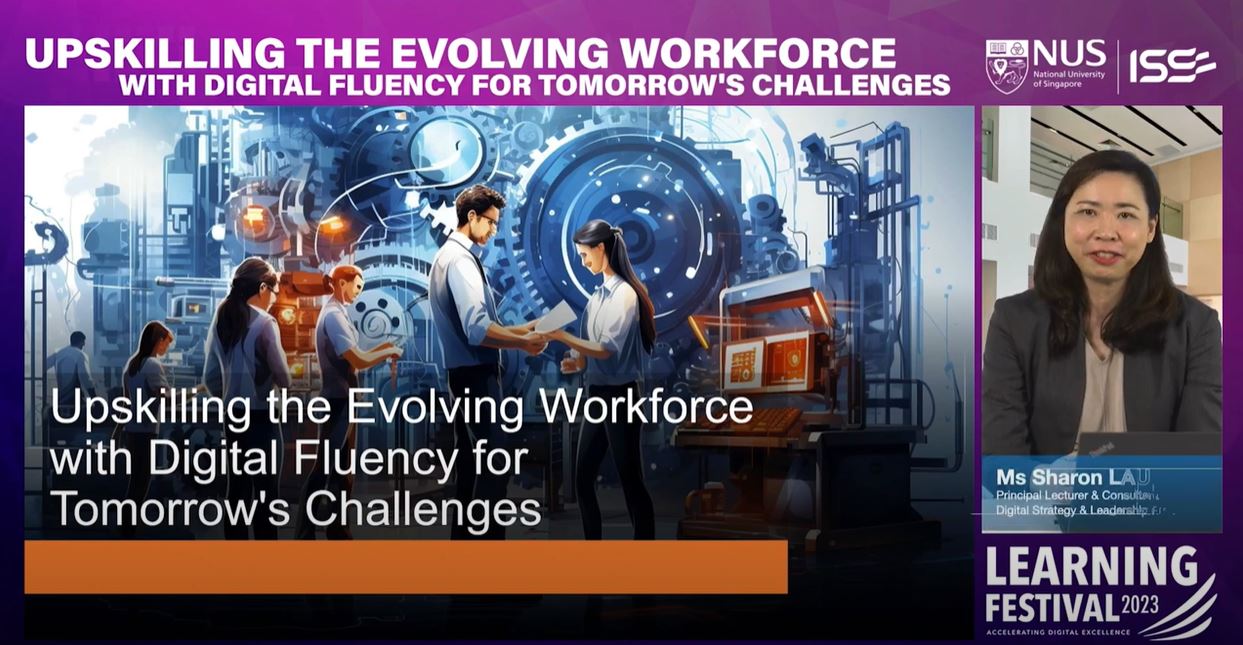From personalised recommendations to real-time data analysis, and more secure, transparent transactions – digital transformation is enabling businesses to deliver more meaningful customer experiences.

Ms Sharon Lau, Principal Lecturer & Consultant, Digital Strategy & Leadership Practice, NUS-ISS; speaking at the NUS-ISS Virtual Learning Festival 2023 on the topic 'Upskilling the Evolving Workforce with Digital Fluency for Tomorrow's Challenges'.
And while technology plays a pivotal role, the core of digital transformation is not just about mastering these new tools.
“It’s also about empowering our people,” says Ms Sharon Lau, Principal Lecturer & Consultant, Digital Strategy & Leadership Practice, NUS-ISS. “To succeed in these evolutions, we must anchor our workforce in digital fluency. This means equipping them with the essential skills and mindset to innovate, adapt, and seamlessly integrate technologies to unlock new value for the business and customers.”
What does digital fluency look like? “It’s a culture where people are not just using digital tools but are proficient and confident in leveraging them to drive business objectives,” she adds. According to the 2020 Global Digital Fluency Study by Accenture, digitally fluent companies lead in revenue growth, customer satisfaction, employee engagement, and are at the forefront of innovations and efficiency.
There are three foundation elements to digital fluency.
The first of which is agility, which refers to proactive readiness of a workforce. “Anticipating and adapting to change in a digital context involves swiftly adjusting to tech trends, reshaping strategies in real-time, and cultivating a culture that embraces change as a catalyst for innovation and growth,” Sharon says.
The second is informed decision-making, leveraging on a foundation of robust data practices. This ensures that decisions are both accurate and strategic, keeping pace with fluctuating market demands and insight. Lastly, it’s about fostering a culture of continuous innovation and customer-centricity. This will enable companies to understand and anticipate the ever-changing needs of customers.
The building blocks
In an organisation, which are the roles that need to be digitally fluent? “While they don’t have to become tech experts, everyone – be it HR, sales or finance – need to embrace the agile, data-driven and customer-centric mindset,” says Sharon.
And adopting an agile workflow doesn’t just mean using tools such as Jira and Trello to keep projects on track. “It’s how they use it – breaking tasks into digestible pieces, prioritising them and working in sprints to incrementally solve complex problems,” she explains. Therefore, even though agile methodologies are commonly practised by software development teams, agile practices are not limited to technology.
Sharon shares how it can be applied to a HR team facing challenges in recruiting the right talent quickly in a competitive market. “After every recruitment drive, they gather feedback, not just internally, but directly from the candidates to understand their experiences, what worked and what didn't. They then implement this insight into the next recruitment cycle, iterating and refining continuously. Over a few cycles, they significantly reduce the hiring time and improve the candidate experience, all while securing the best talent.”
While agility helps us to adapt and respond fast, data acts as a compass in navigating the ever-changing digital landscape.
But the catch is this: The entire organisation needs to be onboard. “We need to create a culture in which every team member instinctively looks to data as their guide. Every individual, from the CEO to the ground-level executive shall ask, ‘What does the data say?’ before making a choice.”
Data-driven decision making should be not a static one-off task confined to isolated instances of data collection or analysis. It needs to be a dynamic, ongoing process, Sharon stresses. “This powerful approach to digital making supercharges our agility. Armed with real time insights, we can swiftly recalibrate our strategies, ensuring that our actions are always attuned to the current needs and opportunities.”
Upskilling as a strategic move
In an era where technologies like AI, quantum computing and blockchains are evolving at a rapid pace, adaptability is a necessity. “Today's groundbreaking innovations might be tomorrow's outdated tool,” Sharon warns. “By imparting core digital skills to our workforce, we are not just addressing the immediate digital landscape. We are also future proofing our organisation against the unpredictable shift that lies ahead."
Hence, upskilling is a strategic move for an organisation to embed a mindset of continuous learning and adaptation within its culture. This will ensure that as the world evolves, the organisation and its people evolve with it, staying ahead of the curve.
Some organisations may find it challenging to set aside time for employee upskilling due to factors such as manpower shortage. Micro-learning can be particularly helpful to these companies, Sharon says. “These courses allow you to acquire essential knowledge through short and concise learning segments tailored for immediate application and retention. The targeted, short learning cycles allow employees to integrate upskilling into their daily routines, without it becoming a burden.”
For example, the Digitalisation Passport Programme by NUS-ISS is designed to address this pain point. It helps employees develop essential digital capabilities in data, digital agility and digital innovation through a blended learning approach supported by a dynamic online platform. “Learners get the best of both worlds; they can enjoy flexible self-paced online learning, as well as interactive live sessions led by experienced NUS-ISS lecturers.”
Sharon emphasises that for organisations, building digital fluency is an investment in tomorrow’s success. “The synergy of agility, data and innovation driven by the empowered individual is the cornerstone of thriving in the digital age.”
This is true for both small businesses and global enterprises. “Digital fluency is key to empowering employees to unleash newfound creativity and ways of working, so that they contribute effectively to the digital transformation journey,” she says.
Watch the recorded NUS-ISS Virtual Learning Festival 2023 talk on NUS-ISS' YouTube Channel here.
For more information on NUS-ISS Executive Education Programmes in Digital Strategy & Leadership, visit here.
For more information on NUS-ISS Blended Learning Programmes, visit here.